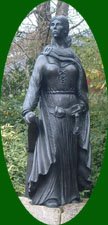Who is Grace O'Malley anyway?
 Just a warning ... this is a long entry, but it gives a pretty thorough history of the mighty woman we named our pub after. For those of you interested enough to read it, I hope you find her as inspirational as we do.
Just a warning ... this is a long entry, but it gives a pretty thorough history of the mighty woman we named our pub after. For those of you interested enough to read it, I hope you find her as inspirational as we do.Since nearly the dawn of time, or at least the 1100s, the O’Malley name has been known as a successful and powerful sea faring clan off the western coast of Ireland. Chieftain of Umhall Uachtarach, or the Barony of Murrisk, Owen Dubhdara “Black Oak” O’Malley was an accomplished sailor with a great herring fleet and traded with countries from Scotland to Spain. The family maintained their home at a castle on Clare Island, strategically located within Clew Bay.
In 1530, Owen’s wife Margaret O’Malley, a noblewoman in her own right, gave birth to a daughter, Gránuaile, known today as Grace O’Malley. Grace would become one of Ireland’s most formidable pirate queens. Indeed the name O’Malley is derived from the ancient Gaelic word maglios, or “chief.”
Although her family carried legitimate trade routes, they also conducted raids on surrounding territories, nabbing livestock and goods when they could. It is thought her father also ferried Scottish mercenary soldiers (Gallowglass) hired out to warring chieftains. Dominating both sea and land seems fitting of the clan’s maxim, Terra Marique Potens, “powerful by both land and sea.”
Grace grew up from a tomboy into a haughty, dark-haired, gray-eyed Irishwoman. From an early age her only wish was to accompany her father on his voyages, but her mother disapproved. In defiance of her mother, and to prove her commitment to her father, she chopped off her dark locks, earning her the nickname, “Gráinne Mhaol,” Grace the Bald. Her mother relented and she began her life at sea.
At the age of 15 or 16 she married Donal O’Falherty, (Donal of the Battles), the tanist, or heir apparent, of the O’Flaherty clan and possessor of the castles of Bunowen and Ballinahinch.
The marriage was more a political alliance between two of the most powerful clans in western Ireland rather than a love match. Though during their marriage, they had two sons, Owen and Murrough, and a daughter, Margaret. Donal was known to have a mean disposition and Grace soon became known as the one who dealt with tribal disputes, politics, and of course, pirating.
Accorinding to legend, Donal was killed in 1565 attacking an island fortress known as Cock’s Castle, which had been taken from him by the Joyce clan. Donal’s clansmen turned to Grace to lead them in avenging her late husband by regaining the castle. Under her direction, the win was swift and the castle was rechristened “Hen’s Castle” in her honor. However, native Irish law (Brehon) did not recognize women as chieftains, so she gathered the men who remained loyal to her, and returned to her father’s territory on Clare Island.
Under the new English policy of “Submit and Regrant,” Irish Chieftains were allowed to keep their holdings as long as they accepted and abided by English rule, which allowed only English ships to transport goods along the coasts of Ireland. However, since Grace had intimate knowledge of the dangerous coasts along Ireland and Clew Bay, she was able to offer protection to ships, for a fee of course. Those that didn’t were boarded and plundered. Her knowledge and mastery of sailing also allowed her to remain elusive, and several accounts say she often appeared to simply fade into the seascape.
Grace used her skill and daring nature to quickly gain the reputation of a reckless and resolute admiral, robbing ships on the seas between England, Scotland and the Continent of their precious cargos. Her fleet grew to include ships that had been seized and stolen. Though there were other female sailors at the time, most controlled a single ship, but Grace O'Malley commanded an entire fleet.
Richard-an-Iarainn Burke was a chief in Connacht and a descedant of Charlemange, with his own fleet of trading vessels. He also controlled the only part of Clew Bay that Grace did not including the castle at Carraigahowley. Never one to settle for less, Grace knew she could only gain Richard's property through marriage, and in 1566, she married “Richard-in-Iron.” However, she also stipulated that upon their one year anniversary, either party could leave the union if it no longer suited them. Sometime after their first anniversary, Richard went off on business and returned to find the doors to the castle locked. There Grace appeared from the roof and yelled, “I dismiss you!” and the castle was hers.
Although this dissolved the marriage, and left her in control of the land, it is believed the two may have been in love as they remained together for another 17 years. This castle later became known as Rockfleet Castle, her mainstay in Ireland from that point on and it is believed to be the place of her death.
The couple had one son, Tibbott-ne-Long (“Teobald of the ships”) who was born at sea and because of this he was always Grace’s favorite. Legend says the day after his birth a North African corsair attacked her ship. Her men were losing badly and it looked as though the ship would be taken when Grace appeared, struck down several attackers and rallied her men to victory.
Around 1576 Grace, returning from a journey, sailed into Howth, near Dublin. As was Gaelic custom, she went to the home of the local lord in search of hospitality, but the lord refused her entrance. In anger and as retribution, she kidnapped the lord’s son and returned with him to Connaught. The condition of his release was that never again would the gates of Howth Castle be closed to anyone who sought hospitality and to this day, an extra place setting is always placed on the table in the castle.
Though rich in adventure, Grace's work was not always above the law and in 1577, while raiding the territory of The Earl of Desmond, Grace was captured and thrown in the Limerick jail. She was transferred to Dublin Castle, where she spent 18 months. There are several speculations about the conditions of her release, but most agreeing that giving up pirating was one of them. It was an agreement she made then naturally, and quickly recanted.
In 1580, Richard-in-Irons was installed as the Mac William of his clan and knighted a year later. This event allowed Grace to henceforth be called Lady Burke, and her investiture is thought to be one of the few occasions in which she donned women’s attire. Richard-in-Irons died in 1583 of natural causes. At that point, Grace quickly gathered cattle and horses and returned to Rockfleet Castle.
Irish political climate was changing and in 1584 Richard Bingham was appointed the new Governor of Connaught. He immediately began removing Irish clans and chieftains from their positions and parceling out their land as he saw fit. Because of her long defiance of English rule, Bingham also ordered the arrest of Grace and made plans to hang her, building new gallows for the occasion. At the last minute, Grace’s son-in-law arrived and promised himself as a hostage if she continued to defy English law. She was freed, but Bingham confiscated most of her herds as well as some belonging to her son, Owen. Bingham also ordered the hanging of 18 of Owen’s men, then brutally murdered Owen.
With her legitimate livelihood gone, Grace returned to pirating. Seeking revenge for her sons death, she also hired the Scottish mercenaries she once ferried, in a planned rebellion against Bingham and his men. In 1592, at the age of 62, Bingham raided Clare Island and seized her fleet. She escaped but was forced to flee to Ulster to seek refuge with the O’Neills and the O’Donnells. Destitute, she wrote a personal petition to Queen Elizabeth pledging her services to the crown in return for an old age pension and the release of her remaining sons, both of whom had recently been arrested by Bingham.
The Queen, intrigued by the petition, sent a formal questionnaire including 18 “Articles of Interrogatory,” for Grace to answer. Unwilling to allow this to be the only information on which the Queen would make her decision, Grace traveled to London to see the Queen face to face.
Queen Elizabeth granted her an audience, said to be an unusual meeting between the two. Grace, in her 60s, swarthy and arrogant, stood firm in a room of powered and coifed men and women of the court. It is said, that when Grace broke into a coughing fit the Queen offered Grace her handkerchief. Rather than returning the handkerchief to the Queen, Grace threw it into the fire, saying, “Surely you would not want me to return a soiled handkerchief.” For all its oddity, the meeting apparently went well as Grace was granted her pension and her sons were freed, all to the outrage of Governor Bingham.
By 1601 Grace was once again feuding with English officials after they captured of one of her galleys. At the same time, her son Tibbott not chosen as the new MacWilliam of the clan, but Grace ordered him to honor her promise to the Queen and sail in her name. Though Grace’s ships remained on the seas, she did not, her old age prohibiting her from making any more voyages. Though this marked the end of her pirate career, Tibbott continued fighting for the English defeating Irish forces, including the O’Donnell clan that sheltered Grace ten years previously. For his service, he was knighted Sir Theobald Burke in 1603, the same year both his mother and Queen Elizabeth died.





